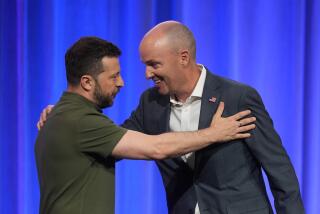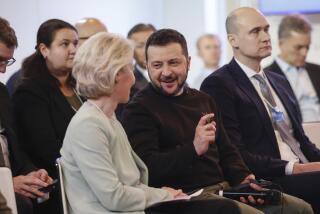Yeltsin, Seeking Wider Support, Woos Managers
- Share via
MOSCOW — Russian President Boris N. Yeltsin, girding for a showdown in two weeks with die-hard foes of his reforms, strove Saturday to win back a key constituency--the country’s vexed industrialists and managers--by promising them his aid and attention.
“The government is ready for a constructive dialogue,” Yeltsin told the All-Russian Union of Industrialists and Entrepreneurs. He promised “gradual” tax relief, increased government assistance to boost factory production and even a share of the foreign aid received by Russia.
Yeltsin’s appearance highlighted his evolving strategy as a fateful session of the Russian Congress of People’s Deputies approaches.
The populist Russian president, whose policies have never been more fiercely contested by nationalists, Communists and reactionaries, is now trying to broaden his base of support and isolate his more fanatical opponents before the Congress convenes Dec. 1, despite Yeltsin’s earlier attempts to postpone it.
As late as Friday afternoon, one of Yeltsin’s key allies, Deputy Prime Minister Mikhail Poltoranin, was publicly lumping Arkady I. Volsky, the industrialists’ elegant-mannered leader, with former Communist Party officials who he said were spouting a “screen of noise” to camouflage their dishonorable intentions. Yeltsin himself had previously scorned the “job appetites” of Volsky and his allies.
However, in what he called the righting of a “miscalculation,” Yeltsin turned out Saturday to praise proposals presented Sept. 10 by the Civic Union, a moderate political opposition group led by Volsky, as “the most comprehensive non-government program of all.”
“I am convinced that part of the Civic Union’s proposals will become part of Russia’s state policy,” Yeltsin told the industrialists, mentioning in particular the need to halt the dizzying decline in Russians’ living standards and revive factory output. He made it clear, however, that some suggestions remain “absolutely unacceptable,” including Volsky’s “slightly disguised desire” to restore Soviet-style administration and enact a freeze on wages and prices.
Yeltsin left the meeting saying he thought he had achieved “rapprochement” with the managers. Volsky told reporters that he and government leaders had agreed to have an “expert group” of officials and Civic Union representatives try by Wednesday to iron out differences between the strict monetarist policies of Acting Prime Minister Yegor T. Gaidar and the continued government intervention in the management of the economy that the Civic Union wants.
If that compromise cannot be achieved, Volsky warned, Gaidar’s government, and by implication, Yeltsin himself, will lose the Civic Union’s backing at the Congress.
Not all of the news delivered by Yeltsin was intended to cheer the managers. He told them that state-owned factories, which have already received $3.75 billion in government aid to liquidate inter-enterprise debt, will not get the additional $2.5 billion they seek.
“If we allowed that, there would be hyper-inflation,” he said. “I call on you to accept this with understanding.”
The main thrust of his words, however, seemed conciliatory: “We should think about how to help you and support your efforts. Let us work in this direction together.” Yeltsin was also able to report “the first, but so far insignificant, signs of changes for the better” in Russia’s economy since market-driven reforms went into effect in January.
Production, down a staggering 27% in August from a year earlier, began to rebound in September, he said. On Russia’s farms, 108 million metric tons of grain were harvested, up from 88 million last year.
Volsky and his loyalists say Russia’s industries are threatened with extinction by the privatization and tight-money policies of Gaidar. So most in Yeltsin’s audience probably silently cheered his announcement that the “time has come to extend support to industry and to stimulate production.”
Russia’s government, Yeltsin said, has drafted a support program for “vital industries” that targets major industrial centers, one-factory towns and 800 former defense plants particularly hard-hit by their forced conversion to civilian production.
Yeltsin also outlined, apparently for the first time, his intention to allow private firms to compete for a share of the $24 billion in foreign credits earmarked for the former Soviet Union.
“We should turn down tied-in credits and accept those that have no strings attached,” Yeltsin also declared. He said that by accepting “tied-in” aid, Russia is obligated to purchase goods made in the donor country, thereby creating jobs not in Russia, but in America, Germany or Japan.
Yeltsin, who charged in a widely reported speech in London last Tuesday that his opponents want to oust him by a coup d’etat, emphasized to the nation’s economic leaders that he can best represent their interests--not the politicians who want to revive the Soviet past.
“We have common aims--namely, to restore the Russian economy and make this economy serve the interests of its citizens,” Yeltsin said. “This government will do everything possible for Russian industrialists and entrepreneurs to work freely.”
How much substance there is to Yeltsin’s pledges should be clear after a government meeting to be chaired by Yeltsin on Monday that is to consider a comprehensive “anti-crisis” program.
Volsky’s initial reaction was clearly favorable, if noncommittal. “Steps toward each other are beginning,” the former Communist Party Central Committee apparatchik told a television interviewer. “If steps are made toward the (leaders of the) economy, the economy will make steps toward the government.”
As for Gaidar’s economic team, which could be supplemented or replaced by Volsky and his people, it was hanging tough as the Congress approached. Poltoranin said Friday that though changes are possible, wholesale replacement of the government is out of the question.
Also contributing to the sense of a looming political showdown, Russia’s smaller working legislature, the Supreme Soviet, passed a law Friday giving itself control over the hiring and firing of individual members of Yeltsin’s Cabinet.
That law, which Yeltsin has not signed and which would reportedly require at least seven constitutional amendments before it could go into effect, was denounced by Poltoranin as an unconstitutional power grab by conservative lawmakers at Yeltsin’s expense.
More to Read
Sign up for Essential California
The most important California stories and recommendations in your inbox every morning.
You may occasionally receive promotional content from the Los Angeles Times.













